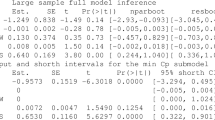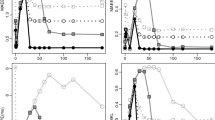Abstract
We examine the finite sample properties of the maximum likelihood estimator for the binary logit model with random covariates. Previous studies have either relied on large-sample asymptotics or have assumed non-random covariates. Analytic expressions for the first-order bias and second-order mean squared error function for the maximum likelihood estimator in this model are derived, and we undertake numerical evaluations to illustrate these analytic results for the single covariate case. For various data distributions, the bias of the estimator is signed the same as the covariate’s coefficient, and both the absolute bias and the mean squared errors increase symmetrically with the absolute value of that parameter. The behaviour of a bias-adjusted maximum likelihood estimator, constructed by subtracting the (maximum likelihood) estimator of the first-order bias from the original estimator, is examined in a Monte Carlo experiment. This bias-correction is effective in all of the cases considered, and is recommended for use when this logit model is estimated by maximum likelihood using small samples.
Similar content being viewed by others
References
Amemiya T (1980) The n−2-order mean squared errors of the maximum likelihood and the minimum logit chi-square estimator. Ann Stat 8: 488–505
Amemiya T (1984) Correction to the n−2-order mean squared errors of the maximum likelihood and the minimum logit chi-square estimator. Ann Stat 12: 783
Berkson J (1944) Application of the logistic function to bio-assay. J Am Stat Assoc 39: 357–365
Berkson J (1955) Maximum likelihood and minimum χ 2 estimates of the logistic function. J Am Stat Assoc 50: 130–162
Chen Q, Giles DE (2010) Finite-sample properties of the maximum likelihood estimator for the Poisson regression model with random covariates. Commun Stat Theory Methods (in press)
Cordeiro GM, McCullagh P (1991) Bias correction in generalized linear models. J R Stat Soc B 53: 629–643
Cox DR, Snell EJ (1968) A general definition of residuals. J R Stat Soc B 30: 248–275
Davis L (1984) Comments on a paper by T. Amemiya on estimation in a dichotomous logit regression model. Ann Stat 12: 778–782
Fahrmeir L, Kaufmann H (1986) Asymptotic inference in discrete response models. Stat Pap 27: 197–205
Ghosh JK, Sinha BK (1981) A necessary and sufficient condition for second order admissibility with applications to Berkson’s bioassay problem. Ann Stat 9: 1334–1338
Gourieroux C, Montfort A (1981) Asymptotic properties of the maximum likelihood estimator in dichotomous logit models. J Econ 17: 83–97
Hughes GA, Savin NE (1994) Is the minimum chi-square estimator the winner in logit regression?. J Econ 61: 345–366
MacKinnon JG, Smith AA (1998) Approximate bias correction in econometrics. J Econ 85: 205–230
Menéndez ML, Pardo L, Pardo MC (2009) Preliminary phi-divergence test estimators for linear restrictions in a logistic regression model. Stat Pap 50: 277–300
Pardo JA, Pardo L, Pardo MC (2005) Minimum \({\phi}\) -divergence estimator in logistic regression models. Stat Pap 47: 91–108
R Development Core Team (2008) R: A language and environment for statistical computing. R Foundation for Statistical Computing, Vienna, Austria. URL http://www.R-project.org/
Rilstone P, Srivatsava VK, Ullah A (1996) The second order bias and MSE of nonlinear estimators. J Econ 75: 369–395
Rilstone P, Ullah A (2002) Sampling bias in Heckman’s sample selection estimator. In: Chaubey YP (eds) Recent advances in statistical methods. World Scientific, Hackensack, NJ
Rilstone P, Ullah A (2005) Corrigendum to: the second order bias and mean squared error of non-linear estimators. J Econ 124: 203–204
Taylor WF (1953) Distance functions and regular best asymptotically normal estimates. Ann Math Stat 24: 85–92
Ullah A (2004) Finite sample econometrics. Oxford University Press, Oxford
Wilde J (2008) A note on GMM estimation of probit models with endogenous regressors. Stat Pap 49: 471–484
Author information
Authors and Affiliations
Corresponding author
Rights and permissions
About this article
Cite this article
Chen, Q., Giles, D.E. Finite-sample properties of the maximum likelihood estimator for the binary logit model with random covariates. Stat Papers 53, 409–426 (2012). https://doi.org/10.1007/s00362-010-0348-z
Received:
Accepted:
Published:
Issue Date:
DOI: https://doi.org/10.1007/s00362-010-0348-z




